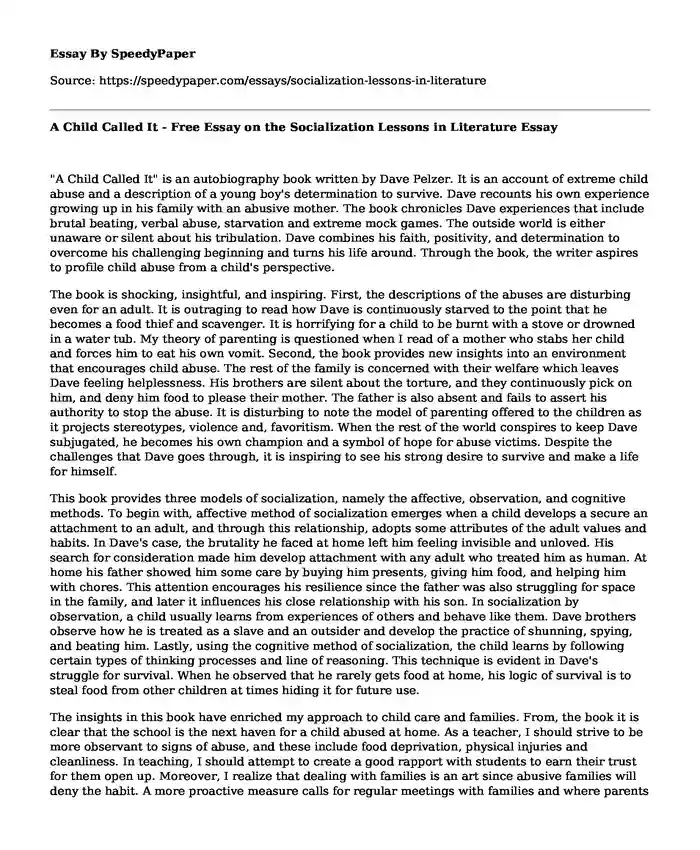
| Type of paper: | Report |
| Categories: | Literature Biography Child abuse |
| Pages: | 3 |
| Wordcount: | 653 words |
"A Child Called It" is an autobiography book written by Dave Pelzer. It is an account of extreme child abuse and a description of a young boy's determination to survive. Dave recounts his own experience growing up in his family with an abusive mother. The book chronicles Dave experiences that include brutal beating, verbal abuse, starvation and extreme mock games. The outside world is either unaware or silent about his tribulation. Dave combines his faith, positivity, and determination to overcome his challenging beginning and turns his life around. Through the book, the writer aspires to profile child abuse from a child's perspective.
The book is shocking, insightful, and inspiring. First, the descriptions of the abuses are disturbing even for an adult. It is outraging to read how Dave is continuously starved to the point that he becomes a food thief and scavenger. It is horrifying for a child to be burnt with a stove or drowned in a water tub. My theory of parenting is questioned when I read of a mother who stabs her child and forces him to eat his own vomit. Second, the book provides new insights into an environment that encourages child abuse. The rest of the family is concerned with their welfare which leaves Dave feeling helplessness. His brothers are silent about the torture, and they continuously pick on him, and deny him food to please their mother. The father is also absent and fails to assert his authority to stop the abuse. It is disturbing to note the model of parenting offered to the children as it projects stereotypes, violence and, favoritism. When the rest of the world conspires to keep Dave subjugated, he becomes his own champion and a symbol of hope for abuse victims. Despite the challenges that Dave goes through, it is inspiring to see his strong desire to survive and make a life for himself.
This book provides three models of socialization, namely the affective, observation, and cognitive methods. To begin with, affective method of socialization emerges when a child develops a secure an attachment to an adult, and through this relationship, adopts some attributes of the adult values and habits. In Dave's case, the brutality he faced at home left him feeling invisible and unloved. His search for consideration made him develop attachment with any adult who treated him as human. At home his father showed him some care by buying him presents, giving him food, and helping him with chores. This attention encourages his resilience since the father was also struggling for space in the family, and later it influences his close relationship with his son. In socialization by observation, a child usually learns from experiences of others and behave like them. Dave brothers observe how he is treated as a slave and an outsider and develop the practice of shunning, spying, and beating him. Lastly, using the cognitive method of socialization, the child learns by following certain types of thinking processes and line of reasoning. This technique is evident in Dave's struggle for survival. When he observed that he rarely gets food at home, his logic of survival is to steal food from other children at times hiding it for future use.
The insights in this book have enriched my approach to child care and families. From, the book it is clear that the school is the next haven for a child abused at home. As a teacher, I should strive to be more observant to signs of abuse, and these include food deprivation, physical injuries and cleanliness. In teaching, I should attempt to create a good rapport with students to earn their trust for them open up. Moreover, I realize that dealing with families is an art since abusive families will deny the habit. A more proactive measure calls for regular meetings with families and where parents are always absent, a teacher can engage Social Services department in-home visits.
Cite this page
A Child Called It - Free Essay on the Socialization Lessons in Literature. (2022, Mar 09). Retrieved from https://speedypaper.com/essays/socialization-lessons-in-literature
Request Removal
If you are the original author of this essay and no longer wish to have it published on the SpeedyPaper website, please click below to request its removal:
- Metallica's Impact on Popular Culture, Music Essay Sample
- Travis Hirschi's Theory Essay Example
- Essay Example on Darwin's View on the Origin of Religion
- Personal Essay Sample: How Critical Thinking Class Helped Define My Goal
- Psychopathy in the Movies, Personality Disorder Essay Sample
- Free Essay. Leadership Styles of Effective Project Managers
- Paper Example: Transformative Research Paradigm
Popular categories




